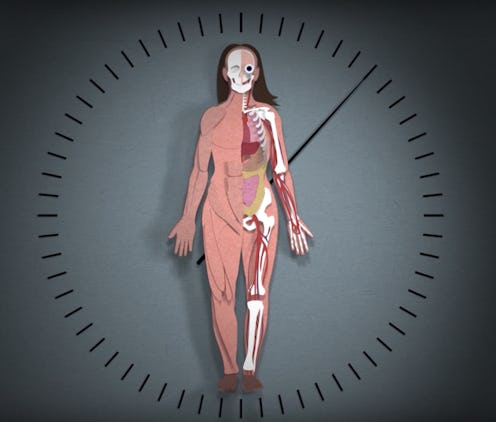Life
This Is How Old Your Body Really Is

If another birthday has left you feeling a bit, well, old, then you may be happy to learn that no matter your chronological age, there are parts of your body that are brand new. The team at Skunk Bear, which tackles all things science for NPR, has released a new video explaining just how old your body really is. You may remember hearing in biology class that the entire human body replaces itself every seven years (which sounds like some strange clone scenario) — but that is a tad misleading.
In the video, host Adam Cole delves into the nitty-gritty of the rates at which certain cells in our body are shed and replenished. "It’s just a matter of time before almost every part of your body refreshes itself," he explains. The well-oiled machine that is our body is working hard to keep us "staying young" without the aid of even green juice and yoga. We may have stopped noticeably growing in high school, but our cells don't stop refreshing and changing just because we become an adult. It doesn't matter how many candles you blow out on your birthday — your hair is young, your skin is young, even your bones are relatively young. So next time you worry about your body changing as it gets older, remember that some parts of you may in fact be different ages all together!
What Cells Are The Youngest?
As Cole explains, some cells in our body are faster to regenerate than others. The lining of our stomach and intestine, for instance, works hard and takes a constant beating from acid and bile used to digest our meals. Because of the taxing environment these cells live in, they are replaced every two to nine days.
If you are worried about a bad sunburn you got over the holiday weekend, you can breath a little easier, because every two to four weeks the entire outer layer of our skin is shed and we get a new epidermis. So, if you think about it, we all have the skin of a baby (since the outer cells are only a month old at most).
Every time you take a shower you probably notice that you lose a few hairs each time. According to Skunk Bear we lose up to 100 hairs a day (which explains why I have to constantly clean out my brush). Every two to seven years we have an entirely different head of hair, and there will be brand new nails on our fingers every six months.
What Cells Are The Oldest?
We may think of certain parts of our body as static, but in reality it just takes longer for some cells to refresh themselves. The term "old bones" is misleading as our skeleton is replaced in its entirety every 10 years — we have one group of cells working constantly to break down bone, while another group of cells creates the tissue that will be our new frame. New muscle cells take even longer to grow, about 15 years — and sadly working out with free weights won't change that.
So which parts of our body, if any, have stuck with us since birth?
Approximately half of our heart tissue remains the same for our entire life, and most of the neurons in our brain have been formed in the womb — though the connections between the neurons constantly change as we create new memories. The cells at the core of our eye's lens were also formed months before we were born and remain the same for our entire life. That transparent tissue hidden behind the iris and pupil is constantly focusing on our surroundings, allowing us to see clearly. It seems poetically fitting that our "window to the soul" should be the OG part of our body that never changes.
Check out the entire video to find out more about our body's many ages:
To learn about how scientists were able to date our cells, check out Skunk Bear's Tumblr. And remember, your chronological age is just a number.
Images: SkunkBear/YouTube